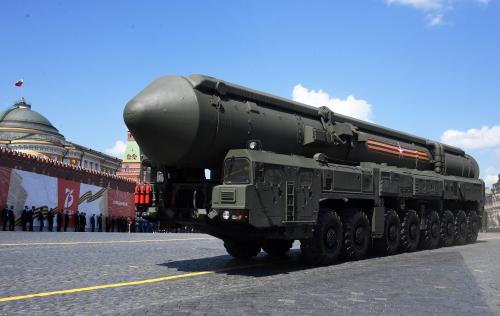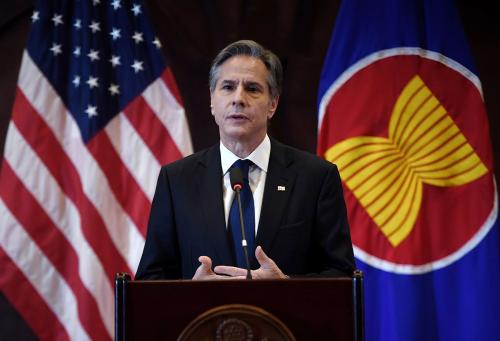President-elect Joe Biden has nominated retired General Lloyd Austin to be the next secretary of defense. Austin is a former commander of the U.S. military effort in Iraq, and if confirmed, he would be the first African-American to lead the Pentagon. His nomination comes with some controversy: He would have to get a congressional waiver to serve, since he has been out of the military for only four years (less than the seven-year waiting period U.S. law requires).
Here, Brookings experts on defense weigh in on what his nomination means.
 Michael O’Hanlon (@MichaelEOHanlon), Senior Fellow and Co-Director of the Center for Security, Strategy, and Technology: Retired General Lloyd Austin is what I call a “soldier’s soldier.” He is popular among many troops that served under his command over the past couple decades, as I can attest from a number of conversations over the years (admittedly statistically non-rigorous). He was an important part of the success of the surge in Iraq, where he succeeded General Ray Odierno as the deputy commander in 2008 — helping General David Petraeus with the massive coordination of Iraqi and American (and some other) troops to key parts of the country. The surge, whatever its other effects, was an absolutely stunning military success that gave Iraqis another chance at rebuilding their country.
Michael O’Hanlon (@MichaelEOHanlon), Senior Fellow and Co-Director of the Center for Security, Strategy, and Technology: Retired General Lloyd Austin is what I call a “soldier’s soldier.” He is popular among many troops that served under his command over the past couple decades, as I can attest from a number of conversations over the years (admittedly statistically non-rigorous). He was an important part of the success of the surge in Iraq, where he succeeded General Ray Odierno as the deputy commander in 2008 — helping General David Petraeus with the massive coordination of Iraqi and American (and some other) troops to key parts of the country. The surge, whatever its other effects, was an absolutely stunning military success that gave Iraqis another chance at rebuilding their country.
Austin’s legacy at Central Command, where he finished his military career as combatant commander in 2016, is more complicated. ISIS rose during the period he was there, and it still controlled large swaths of Syria and Iraq when he stepped down. As ISIS rose, President Obama infamously called it the “JV team” of international terrorism, and it is possible that Austin went along with this sort of interpretation at first. The initial campaign lacked a certain energy. It did hold off ISIS as it attempted to threaten Iraqi Kurdistan and Baghdad — but only with the help of Iran-based militias.
That said, by the time Austin left and certainly by the time Obama himself left office a year later, the campaign to defeat ISIS was coming together. Rebuilding the Iraqi military to do the heavy lifting on the ground, while we provided airpower and intelligence and some involvement by special forces, was much of the essence of the strategy. It was the correct strategy, since it avoided big U.S. deployments and any large American combat role. Austin deserves at least some credit for its conceptualization and early implementation.
All of this is to say that Austin is an accomplished military leader — and, by my personal experience, an affable guy and good listener, too. But it is worth underscoring that his main experiences in the latter years of his service involve the Middle East. I consider today’s top three challenges for the secretary of defense to be China, Russia, and technology/military modernization. Austin will have lots of catch-up work to do to get these right. Notably, dealing with China and Russia requires finesse, confidence, and calm. We must be resolute. But we must avoid letting small crises needlessly and dangerously escalate, and must look for ways to reduce tensions wherever possible.
Finally, there is the matter of civil-military relations. Many are worried that, like James Mattis before him, Austin would require a waiver from the U.S. law that requires anyone be out of uniform for seven years before taking the helm at the Department of Defense. This is a sound law and any waiver should be considered carefully.
While the fact of Austin being a recently retired general is a strike against his confirmation, it should not be a fatal one.
Still, my bottom line is that while the fact of Austin being a recently retired general is a strike against his confirmation, it should not be a fatal one. I consider the state of civil-military relations in the United States generally healthy today. Former National Security Advisor Michael Flynn’s case notwithstanding, the military knows its place in our system of government. There are no modern-day Douglas MacArthurs or Curtis LeMays or William Westmorelands that I can detect. We don’t have lots of retired five-star officers floating around the country like we did after World War II, when the original law mandating a “cooling off” period for any retired officer was first written. In fact, we have no retired five-stars any more. I have detected no signs of insubordination in recent decades, or attempts by military officers to pressure recent administrations into policies that somehow the uniformed military collectively preferred but civilians did not. And I do not see generals and admirals trying to over-militarize U.S. foreign policy; they are often the voices calling for restraint, in fact. It was George W. Bush, for example, who promoted the Iraq invasion, as well as the 2007-2008 surge, and it was Barack Obama who pushed the Afghanistan buildup. Retired generals Vincent Brooks and Joseph Dunford, among others, tried very hard to prevent war against North Korea in 2017, as another example. So did retired general and Secretary of Defense Mattis.
On balance, I will support Austin personally, even as I remain convinced that Michèle Flournoy was the stronger pick. My view is that, to be effective, Austin will need to focus like a laser on Russia, China, and military modernization and innovation. The stakes are quite high.
 Bruce Riedel, Senior Fellow in the Center for Middle East Policy: General Lloyd Austin will be a great secretary of defense, his career leaves me with no doubt about that. The question is not about his qualifications but about the wisdom of another waiver of the law that a uniformed officer has to wait a seven year cooling-off period before being eligible for the position. Having worked in the Pentagon as a deputy assistant secretary of defense, I strongly support the principle of civilian oversight. It should only be waived in extraordinary circumstances.
Bruce Riedel, Senior Fellow in the Center for Middle East Policy: General Lloyd Austin will be a great secretary of defense, his career leaves me with no doubt about that. The question is not about his qualifications but about the wisdom of another waiver of the law that a uniformed officer has to wait a seven year cooling-off period before being eligible for the position. Having worked in the Pentagon as a deputy assistant secretary of defense, I strongly support the principle of civilian oversight. It should only be waived in extraordinary circumstances.
In 2017, there was an extraordinary circumstance: The president of the United States was demonstrably unsuitable for the office and a threat to our democracy. That is more clear today than ever. Retired General James Mattis would serve as a controlling influence on the decisionmaking of an unfit and dangerous president. A waiver was fully warranted to ensure safe hands on the American military. Mattis did play that crucial role for two years. It is likely for example that he prevented the return of torture to America.
No such danger will be the case after January 20, 2021 if Joe Biden is inaugurated president. Joe Biden and Kamala Harris are experienced leaders who are fully committed to the rule of law. They will not embark on reckless behavior that threatens the survival of our democracy and the republic, or do the bidding of a foreign power. The secretary of defense should be a qualified civilian with past experience in the government who can offer her advise to the president, including on occasion advise the White House doesn’t want to hear. The two secretaries I worked for, William Perry and William Cohen, preformed just such roles. Michèle Flourney is an excellent choice to follow them. General Austin is the perfect choice to succeed her in four years.
 Tom Stefanick, Visiting Fellow in the Center for Security, Strategy, and Technology: The recent election resulted in a decision that millions of Americans don’t agree with, but the decision was made fairly. President-elect Biden, in turn, will be making thousands of consequential decisions, and I trust that he will make them in a principled way. He weighed many opinions in his choice for secretary of defense, and made a decision that takes into account many factors and qualifications. The most important qualification for the leadership team that America needs is the ability to function well together under pressure. It appears that Biden has weighed that factor heavily in his choice. Concerns about civil-military relations are serious, but rather than try to second-guess the incoming commander-in-chief as he is building his team, experts in foreign policy and civil-military relations should be refining concrete solutions to address the situation in a way that supports the Biden-Austin team, and reinforce the crucial principle of civilian control over a nonpolitical military.
Tom Stefanick, Visiting Fellow in the Center for Security, Strategy, and Technology: The recent election resulted in a decision that millions of Americans don’t agree with, but the decision was made fairly. President-elect Biden, in turn, will be making thousands of consequential decisions, and I trust that he will make them in a principled way. He weighed many opinions in his choice for secretary of defense, and made a decision that takes into account many factors and qualifications. The most important qualification for the leadership team that America needs is the ability to function well together under pressure. It appears that Biden has weighed that factor heavily in his choice. Concerns about civil-military relations are serious, but rather than try to second-guess the incoming commander-in-chief as he is building his team, experts in foreign policy and civil-military relations should be refining concrete solutions to address the situation in a way that supports the Biden-Austin team, and reinforce the crucial principle of civilian control over a nonpolitical military.
 Caitlin Talmadge (@ProfTalmadge), Nonresident Senior Fellow in the Center for Security, Strategy, and Technology: Presidents enjoy the prerogative of nominating members of the cabinet based on whatever criteria they value most. Selections are not just about expertise or experience, though those are important, but also about personal relationships, politics, and priorities. President-elect Biden has reminded everyone of these basic facts in his nomination of retired four-star Army General Lloyd Austin to be secretary of defense.
Caitlin Talmadge (@ProfTalmadge), Nonresident Senior Fellow in the Center for Security, Strategy, and Technology: Presidents enjoy the prerogative of nominating members of the cabinet based on whatever criteria they value most. Selections are not just about expertise or experience, though those are important, but also about personal relationships, politics, and priorities. President-elect Biden has reminded everyone of these basic facts in his nomination of retired four-star Army General Lloyd Austin to be secretary of defense.
Biden’s choice is historic because if confirmed, Austin would be the first Black person to helm the Pentagon. The choice is also understandable given the close relationship that Biden and Austin apparently developed during the Obama administration and the alignment of their views on some important policy issues in that period.
Furthermore, despite some criticism of Austin because the regional focus of much of his career has been the Middle East — rather than Asia, where growing tensions with China seem likely to require much focus from the future secretary — Austin is without a doubt qualified for the position in terms of substantive knowledge and leadership experience. Numerous other secretaries of defense have brought quite a bit less to the office on both counts.
The civil-military implications of Austin’s nomination are troubling, however. Austin left active duty only four years ago, meaning he will require a waiver from Congress in order to serve as the senior civilian at the Department of Defense. This rule, enacted in 1947, has been waived only twice before, and it exists for a reason.
The Pentagon already has senior military leadership in the form of the chairman of the Joint Chiefs of Staff. His job is to provide the best possible military advice to the president. The secretary of defense, by contrast, is supposed to provide both civilian oversight of the military — a defining feature of democratic governance — as well as a civilian perspective to the president when he must make hard decisions.
There is value in the president hearing a diversity of views.
In practice, neither the military nor the civilian advice a president receives is ever perfect or unbiased. But there is value in the president hearing a diversity of views. It becomes harder to generate that diversity when both the military and civilian staffs that are supposed to provide advice are run by individuals whose thinking and worldview have been overwhelmingly shaped by the experience of being a senior military officer.
In addition, in the long run, the expectation that officers might go on to serve as senior civilians after retirement raises the risk that the prospect of future political appointments may color military advice given while on active duty. And repeatedly drawing on retired general officers to serve as secretary will also generate the impression that civilians are not qualified to be defense leaders, which is not only flat wrong, but also antithetical to democratic values.
Many who supported a waiver for retired General James Mattis to serve as defense secretary in 2017 did so because they believed there was no viable alternative to his selection. Large swaths of the Republican national security establishment had declared themselves “Never Trumpers,” leaving Trump few civilian alternatives.
President-elect Biden did not have this problem, however; he had a deep Democratic national security bench on which to draw. In particular, Michèle Flournoy, a highly regarded defense expert with significant Pentagon experience, was completely qualified for the position and would have brought a welcome restoration of civilian leadership to the Pentagon. Nominating her also would have clearly demarcated the Mattis experience as an anomaly. (I worked for Flournoy from 2003 to 2004, at the Center for Strategic and International Studies.)
Instead, Austin’s nomination erodes that norm of civilian control. It also risks repeating some of the problems of Mattis’ tenure, many of which stemmed directly from the fact that he was a recently retired four-star, not just the fact that he had to work for Donald Trump. On Syria, for example — the issue that ostensibly led to Mattis’ resignation — Mattis consistently pushed policy in a direction that aligned more with the views of the top brass than with the president.
All this said, Biden has made his nomination, one he is entitled to make, and Democrats should avoid undermining their own president’s historic pick for secretary of defense. But they should recognize that granting Austin the waiver will likely change the nature of the secretary’s role in ways that long outlive the Biden administration. Members of Congress should ask plenty of questions about Austin’s commitment to civilian control and think hard about the other leadership posts in the department, which will be important not only to elevate civilian perspectives but also to address the range of issues Austin will face on day one.








Commentary
Around the halls: Brookings experts on defense react to the nomination of Gen. Lloyd Austin
December 10, 2020